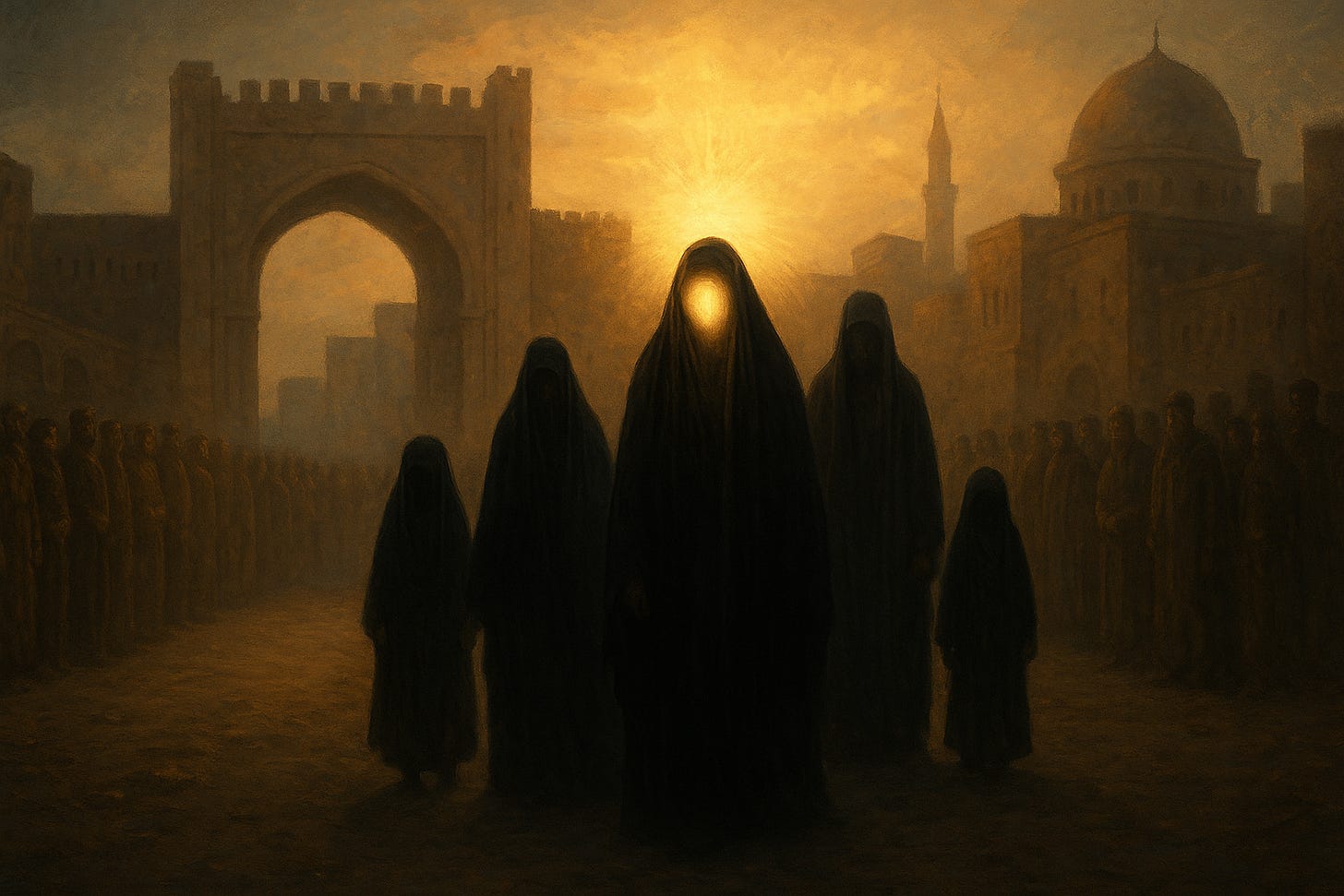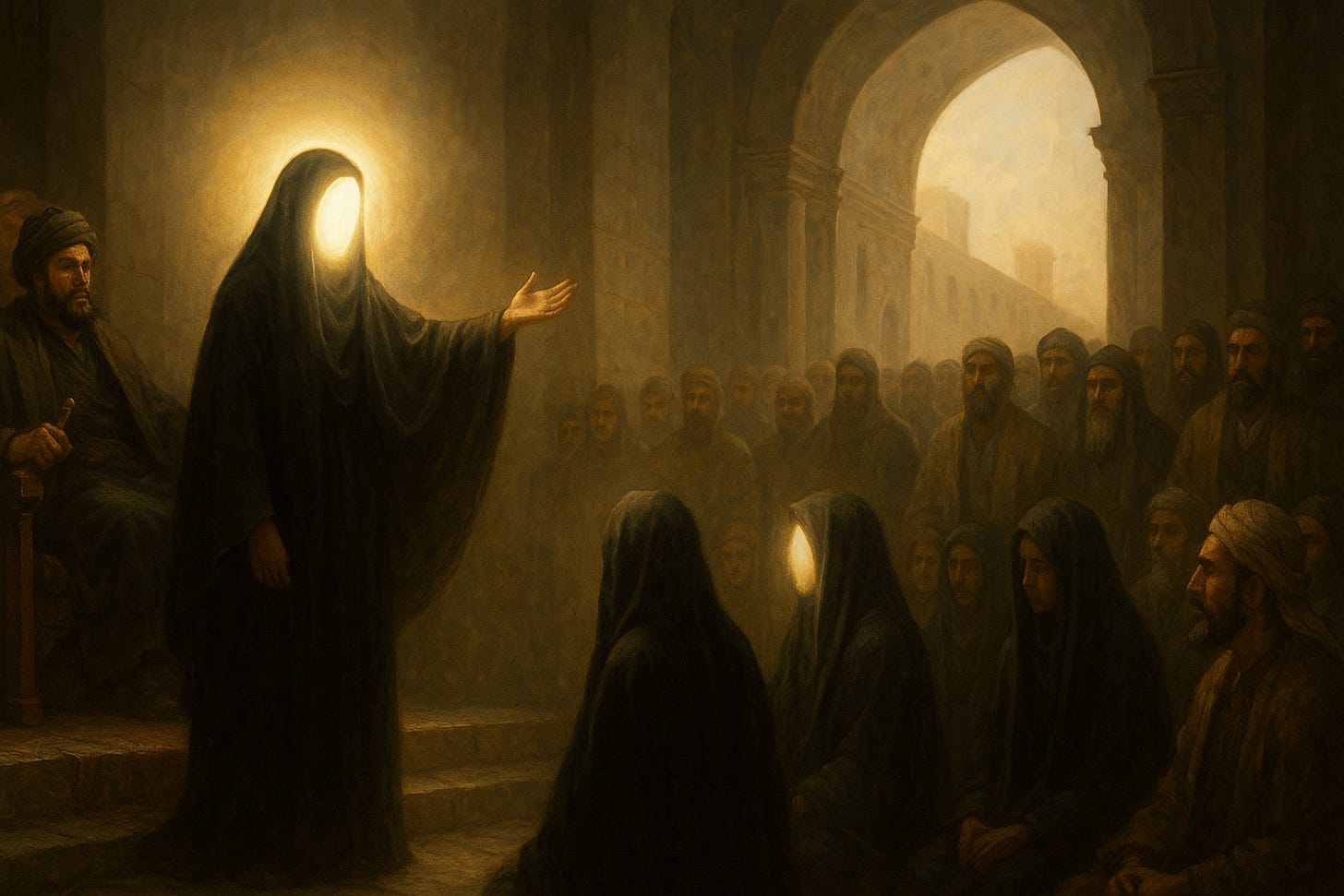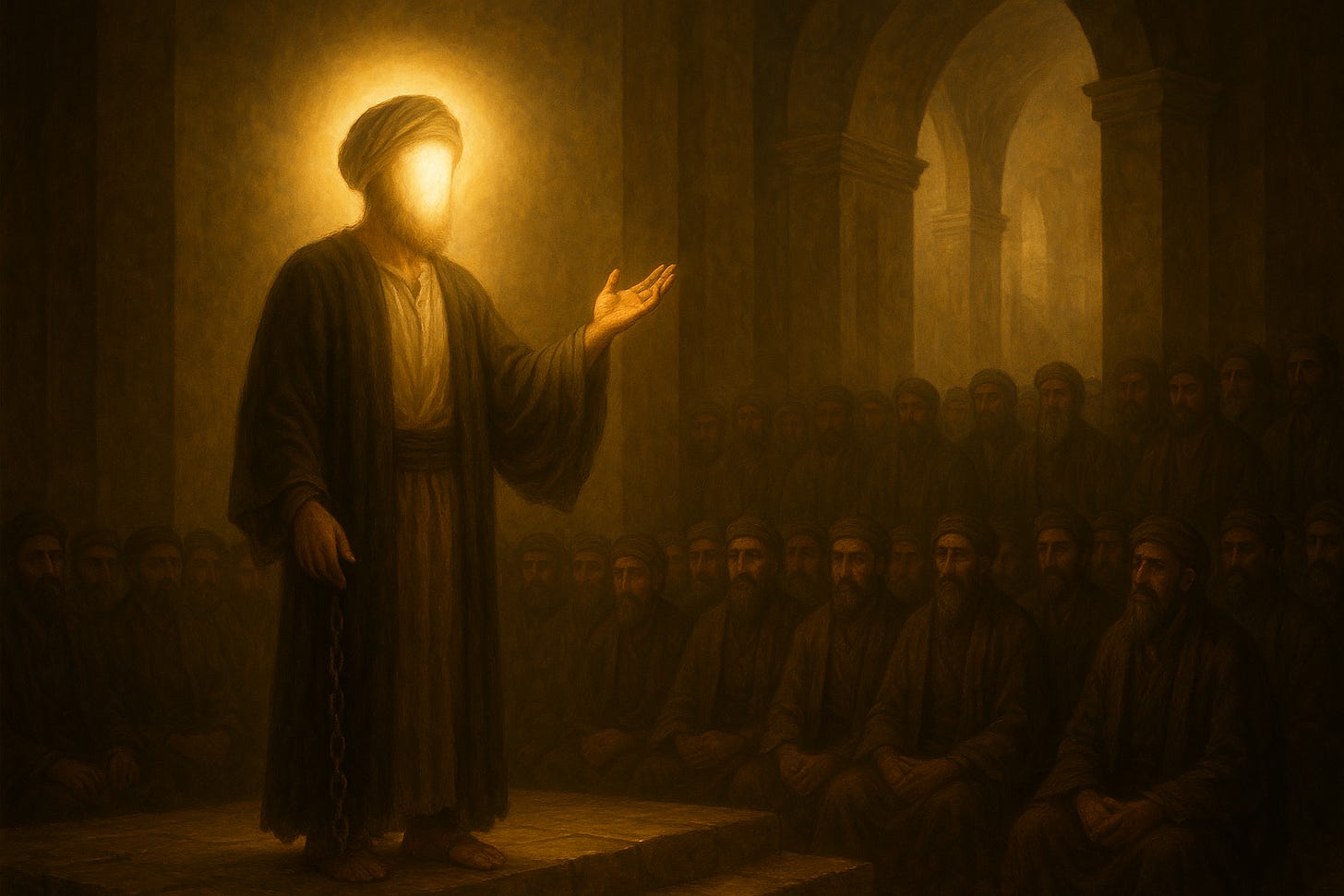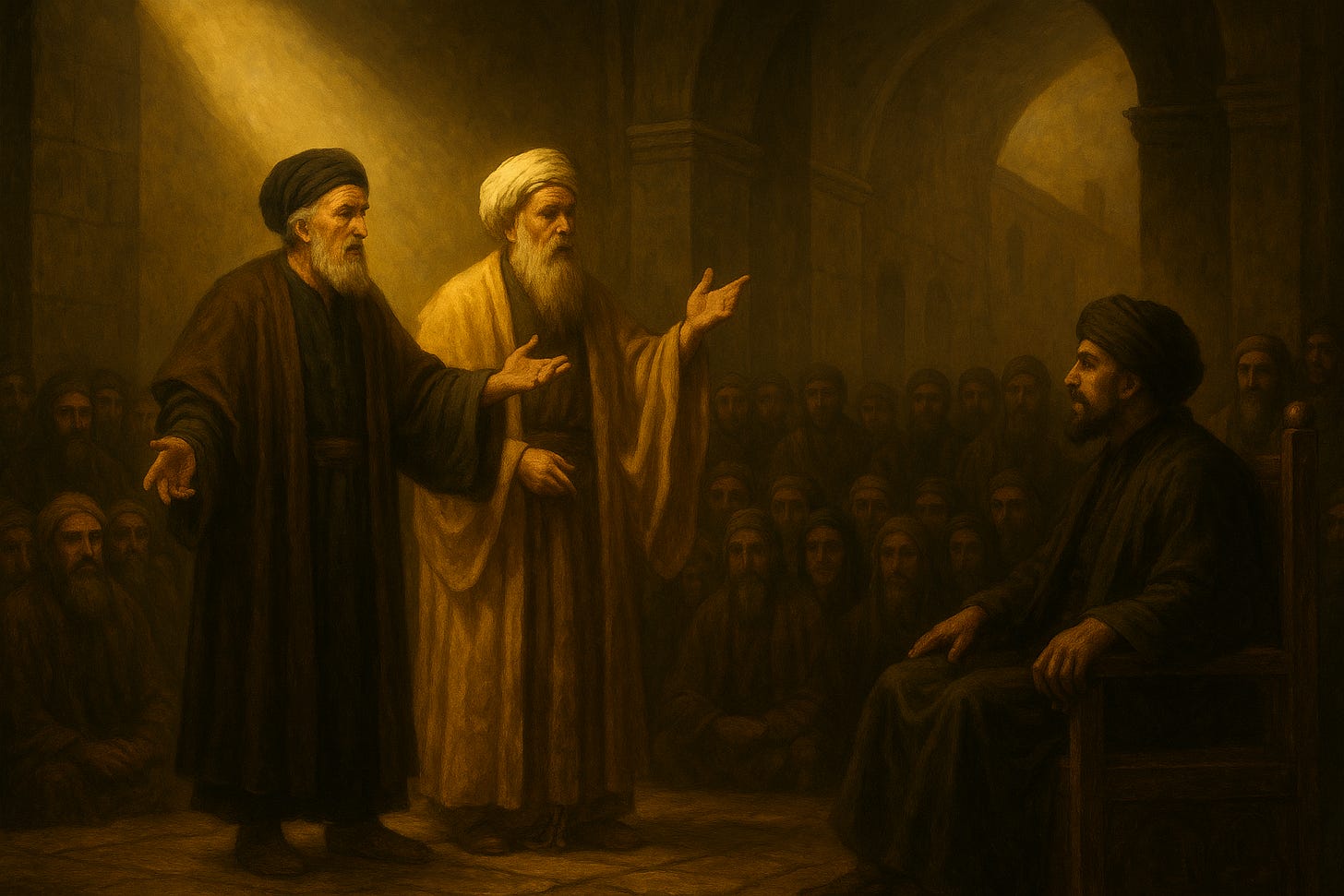[4] Arbaeen Maqtal - The Entry of the Family of the Prophet into Yazid’s Court
This is a series of maqatil (martyrdom narratives - devotional recitations recounting the suffering and sacrifice of the Ahl al-Bayt, the family of Prophet Muhammad). These are for Arbaeen 2025/1447
In His Name, the Most High
بِسْمِ ٱللّٰهِ ٱلرَّحْمٰنِ ٱلرَّحِيمِ
ٱلْحَمْدُ لِلّٰهِ رَبِّ ٱلْعَالَمِينَ وَصَلَّى ٱللّٰهُ عَلَىٰ سَيِّدِنَا مُحَمَّدٍ وَعَلَىٰ أَهْلِ بَيْتِهِ ٱلطَّيِّبِينَ ٱلطَّاهِرِينَ ٱلْمَعْصُومِينَ، أَمَّا بَعْدُ
السَّلَامُ عَلَيْكُمْ وَرَحْمَةُ اللَّهِ وَبَرَكَاتُهُIn the name of God, the Most Gracious, the Most Merciful.
All praise is due to God, the Lord of all worlds, and may blessings be upon our Master Muhammad and upon his pure, purified, and infallible household. As for what follows:
Peace be upon you, and the mercy of God, and His blessings.
Video of the Maqtal (Eulogy)
Audio of the Maqtal (Eulogy)
The Entry of the Family of the Prophet into Yazid’s Court
The sun had barely risen over Damascus, yet the city was already abuzz with a cruel anticipation. The streets were lined with people, some jeering, some weeping, as the battered caravan of the Prophet’s family—his beloved granddaughters, daughters, and the ailing son of Hussain—was paraded through the city. At their head, on a bloodied spear, was the severed head of Imam Hussain, the grandson of the Messenger of Allah.
The captives, weary and wounded, were herded into the grand court of Yazid ibn Muawiya. The tyrant sat on his throne, intoxicated with wine and arrogance, surrounded by sycophants and courtiers. In his hand, he held a cane, which he used to strike the lips and teeth of Imam Hussain’s head, mocking and boasting before the assembly.
Yazid’s voice, slurred with drunkenness, echoed through the hall:
“Would that my forefathers who fell at Badr could see how I have avenged them today! The Hashemites played with kingship, but no revelation came, and no angel descended!”
The court erupted in laughter, but the air was heavy with the silent dignity of the captives. Among them stood Sayyeda Zainab, the daughter of Ali and Fatimah, her back straight despite the chains, her eyes burning with the light of her grandfather, the Prophet.
Sayyeda Zainab’s (AS) Response to Yazid
Yazid, seeking to humiliate her, sneered, “How did you find what Allah did to your brother, O Zainab?” Then in further arrogance, he quotes the following verse:
“Say, O Allah, Sovereign of all dominion, You give dominion to whom You will and remove dominion from whom You will. You exalt whom You will and abase whom You will. In Your hand is all good. Indeed, You have power over all things."
Qur’an 3:26.
Sayyeda Zainab (AS) responded with the following verse:
"And do not think those who disbelieve that Our granting them respite is good for them; We only give them respite so that they may increase in sin, and for them is a humiliating punishment."
Qur’an 3:178.
With unwavering courage, Sayyeda Zainab rose. Her voice, though weary, rang out with the eloquence of her father, Ali:
“All praise is due to Allah, the Lord of the worlds. Blessings be upon my grandfather, Muhammad, and his pure progeny. O Yazid! Do you think that you have gained power over us because the earth has become narrow for us and the horizons have closed in? Do you think that we are humiliated and you are honoured? By Allah, you have not gained any honour, but you have only filled your hands with the blood of the family of the Prophet, and you will soon stand before Allah and His Messenger to answer for your crimes!”
“O Yazid, do you think you have closed all the doors of the earth and the heavens for us, and that we have become captives, driven from city to city? Do you think that by humiliating us, you have gained honour? You are nothing but the son of the freed slaves—O son of the freed slave (يا ابن الطلقاء)! It was the mercy of my grandfather, Muhammad (s), that spared your ancestors. And now you dare to strike the head of his grandson and parade his family in chains?”
“You may plot and scheme as much as you wish, but, by Allah, you will never be able to erase our remembrance from the hearts of the believers, nor will you ever be able to extinguish the light of our message. Your days of power are numbered, and your shame will live on long after you are gone.”
The court fell silent, the arrogance of Yazid momentarily shaken by the majesty of her words.
Imam Sajjad’s (AS) Sermon in Yazid’s Court
A paid orator ascended the pulpit, showering Yazid and his father Muawiyah with praise and cursing Imam Ali and Imam Hussain. The young Imam Sajjad tied in chains, turns towards the orator and tells him:
“O man, indeed you have gained the pleasure of the creation, but have gained the wrath of the Creator”.
Then turning his face towards Yazid he asks:
“O Yazid, may I be permitted to ascend these planks of wood?”
—in reference to the pulpit from where misguidance emanates instead of guidance.
Yazid refuses, understanding that if he permitted Imam Sajjad to speak he and his forefathers would soon be exposed. However there is an uproar from the assembly and Yazid is forced to relent and allow Imam Sajjad to address the gathering.
Imam Sajjad stood, his face radiant with the light of prophethood. He introduced himself to the people, reminding them of his lineage:
“O people! Those who know me, know me. Those who do not know me, may I introduce myself. I am the son of Mecca and Mina. I am the son of Zamzam and Safa. I am the son of Muhammad, the Messenger of Allah. I am the son of Ali, the Lion of Allah. I am the son of Fatima, the Doyen of the Ladies of the Worlds. I am the son of Hussain, who was slaughtered at Karbala, thirsty and alone…”
The crowd, moved to tears, began to weep and wail. Yazid, fearing a revolt, ordered the muezzin to call the adhan, hoping to silence the Imam. As the muezzin reached:
“Ashhadu anna Muhammadan Rasulullah,”
Imam Sajjad turned to Yazid and challenged him:
“O Yazid! Is Muhammad my grandfather or your grandfather? If you claim he is yours, you lie. If you admit he is mine, then why have you killed his family and taken his women captive?”
Yazid, enraged and humiliated, threatened to kill Imam Sajjad, however Nu’man bin Bashir a former governor of Kufa who was present in the court advised him against this action and he relented.
Objection of the Roman Ambassador and the Jewish Rabbi
Unable to contain his outrage, the Roman ambassador rose and addressed Yazid:
“O Yazid! In my land, we preserve a relic of Jesus, the son of Mary, and we honour it with the utmost reverence. You, however, desecrate the head of your own Prophet’s grandson! What answer will you give your Prophet on the Day of Judgment, when he asks you about this crime?”
The court fell silent. Yazid’s face darkened, but the ambassador continued, his voice trembling with righteous anger:
“Had we been blessed with a lineage such as yours, we would have carried their memory with pride and love, not with chains and humiliation. Woe to you, Yazid! You have shamed your nation before the world.”
Moved by the ambassador’s words, the Jewish rabbi stepped forward. He, too, had recognised the nobility of the captives and the sanctity of the Prophet’s family. He turned to Yazid and said:
“We have read in our scriptures of the coming of your Prophet, and we know of his family’s honour. How can you treat the children of your own Prophet with such cruelty? In our tradition, even the enemies of our prophets are not treated in this manner. Fear God, O Yazid, for the wrath of the Almighty is severe.”
The captives, hearing these words, felt a moment of solace—proof that the truth of their suffering transcended faith and nation. The people of the court, too, were shaken. Some wept openly, while others hung their heads in shame.
Yazid, humiliated and enraged, ordered the ambassador and the rabbi to be silenced and removed from his presence. But the words of these men echoed through the halls, a testimony to the universal respect for the Prophet’s family and a condemnation of Yazid’s tyranny.
The Witness in Occultation
In that moment, the world bore witness: the dignity of the Ahl al-Bayt could not be diminished, not by chains, not by swords, and not by the arrogance of kings.
The captives were hurriedly sent to dungeons beneath the palace, in order to avoid any further embarrassment and humiliation to Yazid and Bani Umayyah.
Though unseen by the eyes of the world, the Awaited Imam, al-Mahdi (ajtf), bore witness to the steadfastness and suffering of his Aunt Zainab and his Grandfather Imam Sajjad (AS) in the court of Yazid. Their patience and courage in the face of tyranny became a beacon for all generations, a trust carried in the heart of the final Imam, who would one day rise to avenge their blood of the martyrs and restore justice to the earth.






